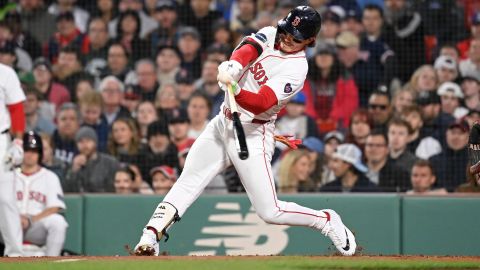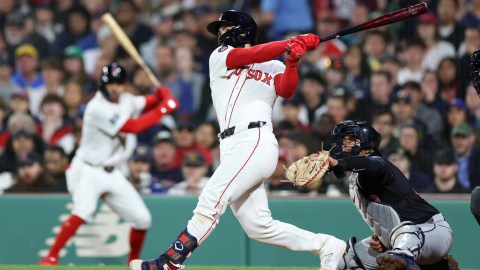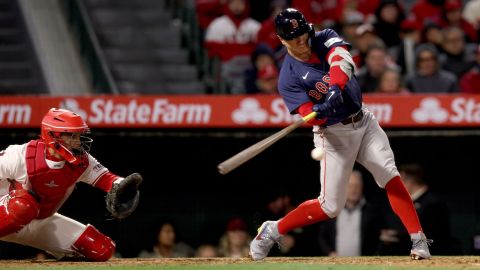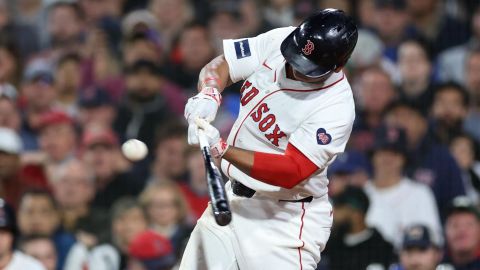Jarrod Saltalamacchia has all the tools to be successful. When the 25-year-old blossoms, the trade that brought him to Boston last July will be hailed as a shrewd one by general manager Theo Epstein.
At the current time, fans are still waiting for that process to play out. Saltalamacchia is hitting just .154 (4-for-26) with 11 strikeouts, has been inconsistent with his throws and has been behind the plate for several of the rotation's poorest starts. Realistically, those fans should be plenty patient. Not only is Saltalamacchia a young player, but he's only played 19 total games for the team. Also, he has a great captain whose influence will only assist over the long term. And, there is no denying that the only way for Saltalamacchia to become that rock for the rotation is to get playing time.
However, in the midst of the worst start in team history, the Red Sox might want to avoid pushing the issue until they know what they have, both in Saltalamacchia, and in their team as a whole, which has not resembled anything they expected to this point.
There should be no overt efforts to prove that Saltalamacchia is the catcher of the future, just for the sake of proving that they made the right move in bringing him aboard and labeling him so.
That does not mean that the former Atlanta Brave and Texas Ranger should not get the lion's share of starts. He should. But sprinkling in Jason Varitek a bit more, perhaps two of every five starts, might be the way to go for now. It could help Saltalamacchia to stop pressing at the plate, and for him to take one extra day a week to watch the master at work can only help.
Remember, when Saltalamacchia came aboard last season, Varitek was sidelined. In fact, they were healthy at the same time for only a few weeks last year, both serving as backups to Victor Martinez in the team's floundering days of September.
Perhaps it's too late to be saying this. Maybe this is how it should've been mapped out to begin the year, rather than starting Saltalamacchia in four straight games and in seven of the first eight, only one of which resulted in a win, and an ugly one at that. But the impact of a time-share could be twofold. While having Varitek in one more time a week could take some pressure off the starting catcher, it could also have an immediate impact on the win-loss record, which as we know is horrible right now.
The team ERA with Varitek behind the plate is 3.86. With Saltalamacchia, it is 8.06. Those figures will normalize over time, but some of the separation may have to do with their respective comfort levels, and those of the guys throwing the pitches.
There are two schools of thought at play. One is to put Saltalamacchia out there as much as possible, a trial-by-fire approach, until he solidifies himself as that team leader in the mold of Varitek. The other is the one proposed on this page, for him to still be the starter in name but also a guy who can sit and watch and not have his career path with the organization completely screwed up just because he isn't in there four nights in a row.
The latter may gain some support due to the recent shuffling of the rotation. By separating Josh Beckett and Daisuke Matsuzaka, the Red Sox have split up the two guys who have always performed well when throwing to Varitek.
When the two right-handers were together in the rotation, it was more difficult to pair them with Varitek each and every time. For instance, if Varitek caught Beckett on a Saturday night and Matsuzaka was pitching in a day game on Sunday, it would be tough to bring back Varitek for that afternoon affair. And if you put Saltalamacchia in that afternoon and still want him catching the other three starters the majority of time, that would make him the backstop of choice in four straight games. Not that he cannot handle it, and not that the team doesn't want him to in time, but that is less of an issue now that Beckett and Matsuzaka are not pitching on consecutive days.
The quirks of the schedule, injuries and pitching matchups never allow anything like this to remain in stone, so both guys will still catch all pitchers. But at least having that intent is worth the try. Already, we've seen Beckett have the team's best start of the season when throwing to Varitek, whom he remarked has a "calming effect" on him. The same goes for Matsuzaka, who was at least average when throwing to Varitek before looking lost with Saltalamacchia behind the plate, although that may have had nothing to do with the catcher — almost nothing reached his mitt anyway.
This is just a subtle proposal that many observers wouldn't even notice if it was to be formally enacted. But Terry Francona hinted all spring that Varitek would probably get more playing time than most people expected. The immediate benefits to following through on that plan (less pressure on Saltalamacchia, more time for him to get comfortable as the starting catcher, preferred receivers for Beckett and Matsuzaka) could outweigh the risks, which would be a virtually negligible impact on Saltalamacchia's growth.
What are your thoughts on the catching situation? Share your thoughts below.



